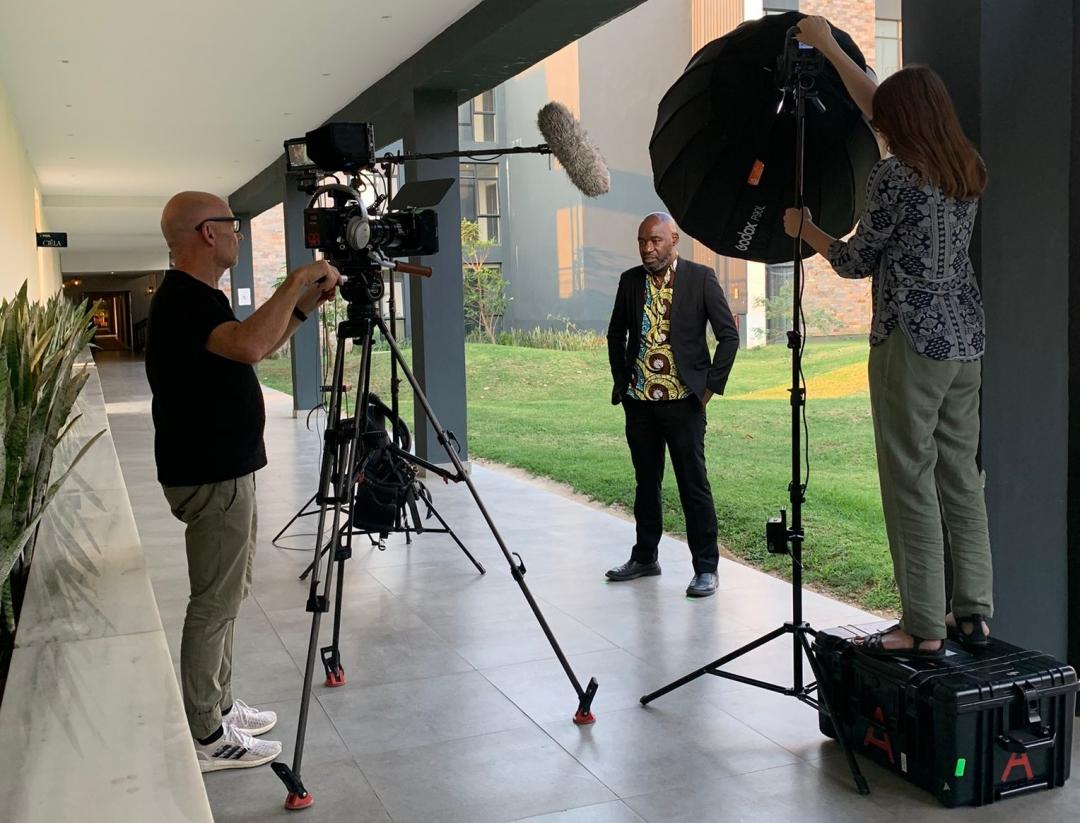We are driving down a dirt road west of Lusaka, Zambia. Cattle are grazing on a pasture off the road while our car is bumping past, one pothole after the other. The landscape is dry and waiting for rain. From time to time, a jacaranda tree pierces the brown and dusty green with its purple blossoms.
At a crossing, another car awaits us. We meet with John Tembo, Head of Operations at Alliance Ginneries Ltd. He manages the cotton supply for the company in Lusaka, which produces lint – ginned cotton – for export. John takes us where some of the cotton is produced: Namayani, a small village surrounded by harvested fields.
Our iBAN team has set out to produce a film that tells a story of Inclusive Business in Zambia. It is a complex story, one that needs to be told from multiple perspectives. Travelling with 100 kilos of filming equipment, we are visiting four companies, an investment summit, policymakers, and communities in Zambia. In the end, we will condense all the material into a documentary clip.
Where cotton comes from
In Namayani, we talk to Eileen Nkwanisha, a cotton farmer and head of the local women’s group. She lives in a neat brown hut decorated with potted flowers. The power grid does not reach there, let alone the water pipelines. Sitting on a chair under a wide green tree, she talks about her life: about her crops, her children, and her dreams. By working with Alliance Ginneries, she has better access to loans and markets. With her additional income, she can afford to send her kids to school. “When they grow up, I want them to have good jobs,” she tells us.
Her story is part of Inclusive Business: Working with an impact-driven company takes her one step closer to fulfilling her dreams.

Investing in aspirations
Another day, another scene. We are visiting the Zambia Impact Investment Summit (ZIIS) at a high-end resort on the northern boundary of Lusaka. The building is adjacent to a golf course, shielded from urban noise and dust. Today, the building brims with women in bright dresses and men in neat suits.
Hosted by Impact Capital Africa and the Zambian National Advisory Board for Impact Investment, ZIIS is a meeting point for investors, entrepreneurs, policymakers, and development workers. For two days, they are discussing, networking, and striking deals.
We are here to film another strand of the story. While inclusive businesses turn profits and make a social impact, they also need to scale. For this, they require investments. Rushil Patel, co-chief investment officer of Inside Capital, tells us why investors should care: His company has invested in an inclusive business that is profitable, creates opportunities for marginalised communities, and positively impactes the environment.
Later in the day, we meet Simunza Muyangana of innovation hub BongoHive. He is passionate about low-income markets – people with little money but their own lifestyles and aspirations. Serving these markets makes business sense. This is another part of the story.
Gathering voices
Storytelling is all about voices – voices that are diverse, complementary, and sometimes contradictory. The story of Inclusive Business is not just a tale of flashy boardrooms. Neither is it all about villages, or kids going to school. To see the whole story, we need to look at multiple strands, woven into one great narrative of social impact and societal change.
The film we are producing in Zambia – to be published in early November – will try to do just that. “I have been pitching it for years,” says Susann Tischendorf, Director for Communication and Digital Innovation at iBAN and responsible for the project, “because I deeply believe that it will have an impact. It will spark people’s curiosity, inspire them, and help them understand what Inclusive Business is all about.”

The bigger picture
Where do Rushil’s, Simunza’s and Eileen’s tales converge? Their lives and dreams differ, but they tell us aspects of the same big story. It is the story of how Inclusive Business is changing societies.
In Namayani, children are going to school thanks to dedicated parents and Inclusive Business. They will be better educated and able to grasp more opportunities than any generation before them. Like them, children all over the country are gaining brighter prospects and the potential to transform the world they live in.
Meanwhile, education is not the only trend transforming societies. All over the world, climate change is posing daunting challenges and causing upheaval. Inclusive businesses cannot reverse it on their own, but many of them innovate for mitigation.
In Zambia, we talked to entrepreneurs developing draught-resistant crop varieties, recycling waste bottles, and trialling organic farming. There is one sentence many of them repeated: “The future of Africa is bright.”
